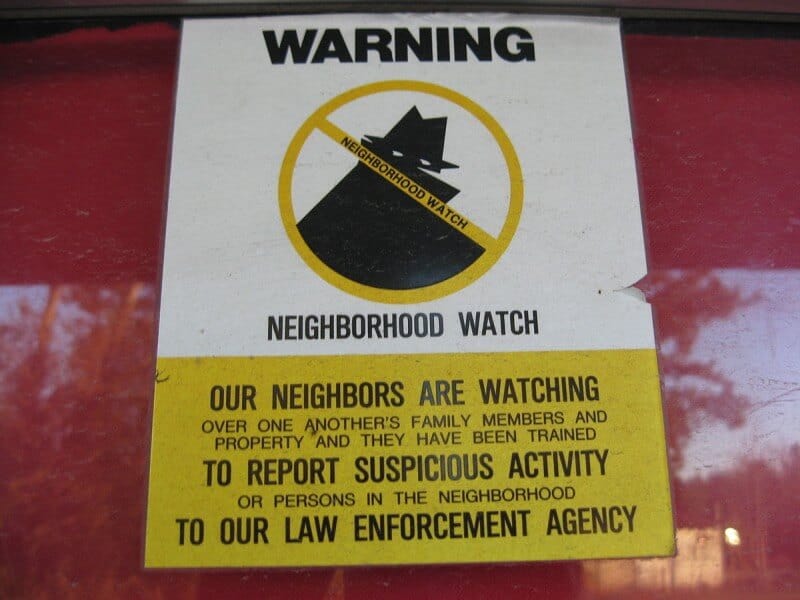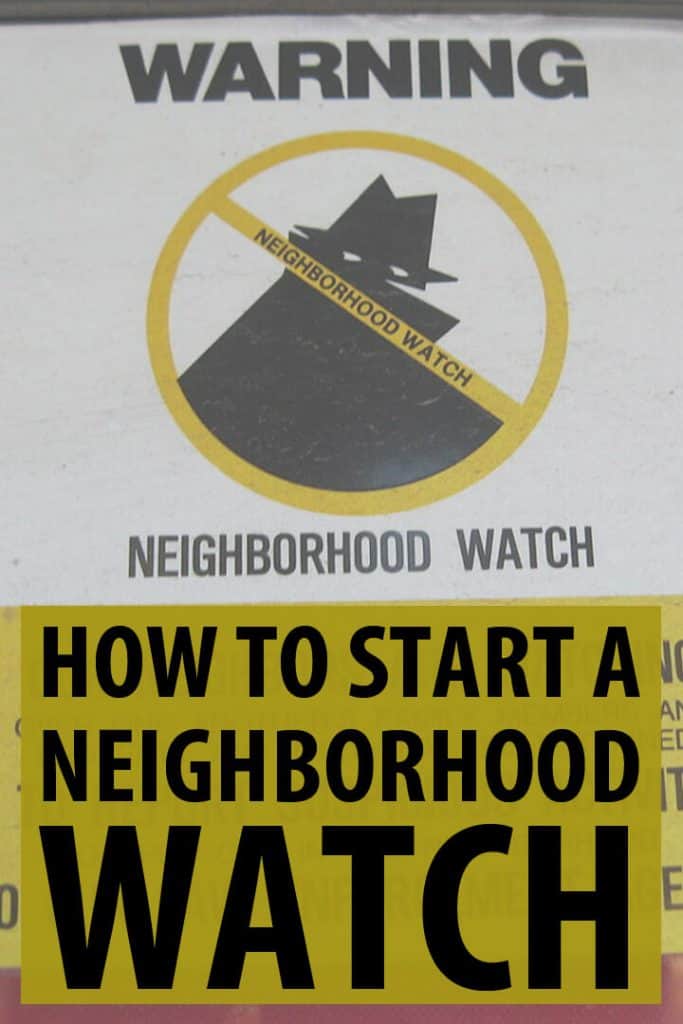Is starting a neighborhood watch a huge breach of OPSEC for preppers? Not necessarily. Many preppers have yet to take advantage of all being a part of such a community watch program can do to benefit their own families. We are all in this together, even if non-preppers fail to grasp that all-important fact.

Neighborhood watch programs are comprised of a group of organized residents in a small community or specified number of blocks that are working together to make their area safer in conjunction with local law enforcement agencies.
Members of the neighborhood watch are striving toward the same goal – making where they live as safe as it possibly can be from threats of criminal activity.
Community watch programs improve the quality of life in a neighborhood while empowering the folks who live there to better learn how to protect their homes, families, and properties. It is a volunteer program that in recent years, has also become more increasingly focused on protecting the neighborhood and community at large, during local disasters.
You do not have to announce you are a prepper, of even invite neighbors into your home to form or become a part of a neighborhood watch.
Once the neighborhood watch is formed, and you become better acquainted with your neighbors, it is then that you can begin to introduce self-reliance skills and the benefits or having a survival mindset to them – if you so choose.
Table of Contents
Neighborhood Watch History
The community crime watch system was developed during the late 1960s after residents in Queen, New York were shocked and then outraged over the murder and sexual assault of Kitty Genovese.
More than one dozen witnesses reportedly witnessed the horrific crime, but did nothing to step in and help either save Genovese or catch her murderer.
A book by Jane Jacons, The Death and Life of Great American Cities published the following year, urged everyone to keep “their eyes on the streets” and reach out to one another in their own neighborhoods.
Local, state, and federal law enforcement agencies began encouraging Americans to become more involved with crime reporting and safety issues in their neighborhoods and communities.
During the early 1970s, the National Sheriff’s Association spearheaded and offered some grant funding via the Department of Justice, to form neighborhood watch groups around the United States.
For several years, the community patrol groups served only as a communication sharing avenue between residents in their neighborhoods and law enforcement agencies. Several years later, the watch groups actively began partnering with law enforcement to report various types of crimes and walking the streets in their neighborhoods to help deter criminal activity.
How To “Sell” The Neighborhood Watch Idea
Adding commitment to busy schedules is not something all folks will initially be eager to do. Presenting a clear set of obligations and responsibilities on a well organized flier will go a long way in generating interest in the formation of a neighborhood watch.
Our local heroes are incredible people, but they are only human. It is unrealistic to think they will still be capable or even willing to patrol and the streets, putting out fires, and respond to various types of emergency calls during a SHTF event – especially if they live nowhere near your own neighborhood.
Networking with law enforcement through a neighborhood watch program will get everyone better acquainted with those who protect and serve them now – and them with you. Initiating a partnership to help keep crime down and catch those who do harm in the neighborhood is a great selling point when trying to form a neighborhood watch.
Sharing accurate information about how long it could take for a local hero to arrive on the scene when NOT hampered by a weather emergency, and what could happen to the potential member’s family during those five to 20 minutes, should help fill seats and your first watch meeting.
Prepping Benefits
Yes, and below are just a few of the biggies you should really consider.
- Food Security – Teaching others how to grow their own groceries means your neighborhood will be more food secure during a disaster. A hungry populace is a panicked and distracted populace – and one that is willing to kill or steal what you have.
- Emergency Utilities – You should, at some point, be able to naturally introduce the importance of having a dependable water supply and generators in case of a severe weather incident. Even non-preppers can relate to being without power after a storm, and have probably lived through something like that at least once in their life. Without revealing that you are a prepper, you could share information about such things in relation to keeping the neighborhood safe, and watch radios charged without feeling like you are standing underneath of a blinding sign that reads, “PREPPER!”
- Armed Threats And Benefits – While it depends on where you live, neighborhood watch members can be armed. Knowing how many folks around you have guns if you live in the suburbs or urban areas where being armed 24/7 is not commonplace like it is in rural areas like mine (where all preppers should really move) could be highly useful information to have before a societal collapse. Helping others to learn how to use a gun or to become a better shot, learn how to reload, etc. is also another way to covertly turn watch members into preppers so they can better defend the neighborhood, and perhaps even be able to go hunting wild game.
- Grid Down Communications – Neighborhood watch members are all issued handheld radios, which will allow you to communicate quickly when a threat is nearing the area during a disaster. This basic introduction to communications might even spark interest in watch members becoming HAM radio operators.
- Self-Reliance Skills – Introducing prepping without calling it prepping, could involve something as simple as sharing produce from your garden with watch members during meetings and then offering to help them learn how to grow and preserve their own food, as well.
- Community Awareness – If you live somewhere like I do, you already know everyone and their brother, as the saying goes. But in suburban and urban areas, that is less frequently the case. You could have a nurse, doctor, veteran, veterinarian, and retired police officer living in your neighborhood and not even know it. Connecting with these folks over the neighborhood watch program could one day vastly serve to enhance your own chances of survival.
Additional Points
1. Criminals tend to shy away from neighborhoods that post signs alerting them to the existence of a watch group – especially when the members are both active and visible on a routine basis.
2. The neighborhood will be a safer place to live and raise children in, places that are safe enough for older children to remain home alone.
3. A watch group helps bring people together, which makes the neighborhood safer for everyone while fostering a sense of belonging and friendliness.
4. Children in need of help will have somewhere safe to run to during an emergency because of the formation of the neighborhood watch and their familiarity of those involved in the group.
Community watch signs are a must, but can have both a positive and negative effect. Some folks will see the signs and assume the neighborhood is a high crime area because a watch has been formed. In theory, this could attract more criminals to area and quality potential homeowners to look elsewhere to buy a house.
When neighborhood watch groups remain active and involved in their community, there can be both success and well-maintained signs. If participation and enthusiasm for the watch ends, so will the condition of the signs.
When the signs show wear like fading, rust, or graffiti, the neighborhood could appear to be a high crime and neglected area – which would invite more crime.
How To Start a Neighborhood Watch
1. Create a plan for the group: criteria for joining, when and where the meetings will take place, what training and background checks will be required, as well as any financial commitment or fundraising necessary for radios, signs, etc.
2. Set up a meeting with local law enforcement and other first responder agencies to let them know what you are doing, ask for their input and partnership, and guidance in following any formal steps that need to be taken to create the neighborhood watch.
3. Create fliers about the neighborhood watch group and the first meeting to post in public places and businesses. But, walking around the neighborhood and talking to folks who live there and handing out fliers is also vital to the project – the personal touch and one-on-one conversations will likely convince more folks to take an interest than one more colorful flier on a bulletin board.
4. Take advantage of free advertising opportunities. Information about a neighborhood watch is considered a public notice and should be able to be included at no charge with local newspaper, television, and radio. Start social media groups – pages for the neighborhood watch to further spread the message.
5. Invite law enforcement to the first meeting, and have a list prepared to discuss neighborhood concerns so an action plan and a patrol schedule can be developed.
6. Make a master list of all members and their contact information that is shared with everyone involved – including law enforcement officers.
7. During the first or the second meeting, after background checks have been conducted (if that is a part of you plan), a vote should be taken on neighborhood watch policies and leadership positions.
8. Create a communications plan. This should involve the purchase and – or of compatible radios. Develop codes and a printout of them for watch members to use when relaying information about an incident or threat – you do not want a criminal with a handheld 2-way scanner to understand what you are talking about and planning to do.
Having this code in place before the SHTF will allow you to easily continue covert communications with the other members. Watch members should be issued a number to use during communications instead of using their names for safety reasons.
9. Create a detailed map of the neighborhood with the homes of members noted for quick reference during a threat or call to action in a specific area so everyone knows who can respond most rapidly.
10. Consider hosting some type of neighborhood event to introduce the group to the community and perhaps raise funds for needed items.
Neighborhood Watch Potential Positions
- Watch Marshal – The leader of the group. This person should also be the liaison with law enforcement and first responder agencies.
- Block Captain – The watch member in charge of a specific block.
- Assistant Block Captain – A second in command to a block captain.
- Building Captain – If apartment buildings exist in your neighborhood, consider having a captain for the building, floor, or section of buildings if it is a large complex.
- Assistant Building Captain – A second in command to the building, floor, or complex section captain.
- Training Officer – The member in charge of planning, coordinating, and running trainings for the neighborhood watch group.
- Secretary – This member will record meeting minutes and take care of creating and posting notices to the neighborhood residents and media.
- Treasurer – This neighborhood watch member will handle all purchasing, dues collection, fundraising money, etc. A bank account with 3 signatories should be created to process and hold the funds – the treasurer, marshal, and one other person in a leadership position should be signatories on the bank account. Receipts should always be given when money changes hands.
- Community Liaison Officer – This person should be the contact for concerns, complaints, and suggestions from neighborhood residents and the person who spearheads any public events.
- Youth Development Officer – This member should be in charge of engaging with youth in the neighborhood to discuss safety issues, make them familiar with the watch, its members, and how they can help, and possibly host events – trainings designed to help the children know how to respond to threats, including first aid and self-defense activities.
- Financial Officer – This neighborhood watch leadership position would work on potential grant funding, donations from community partners, and, if necessary, securing non-profit status for the group.
Neighborhood Watch Legal Liabilities
Following the policies and guidelines mandated by your local law enforcement agency partners is the best (really, the only) way to avoid legal problems for yourself and the formally established neighborhood watch group.
Policies and rules vary by community, township, county, and state. But, the general tips below are written in stone no matter where you live.
1. No action should be taken by watch members when they observe criminal or suspicious activity. They are only to serve as an extra pair of eyes and ears for law enforcement officers.
2. Law enforcement should be alerted immediately to any suspected criminal or suspicious activity.
3. While it is not required, all neighborhood watch groups should register with the National Neighborhood Watch program – previously known as USAonWatch. The group assists in forming and training community patrol groups.
4. Whether or not a watch member is permitted to carry a gun comes down to location – i.e. local laws. While the National Sheriff’s Association neighborhood watch group advice states, “Patrol members should be trained by law enforcement
It should be emphasized to members that they do not possess police powers and they shall not carry weapons or pursue vehicles.” But, being a member of a watch group does not take away a person’s right to legally carry a gun under the existing local and – or state laws where they live.
Could carrying and using a gun while participating in a watch patrol activity open you up to increased legal liability – maybe. The George Zimmerman and Trayvon Martin case definitely comes to mind here.
You may be the only prepper in your neighborhood, but after starting a watch group, you could be one of many. The more self-reliant and prepared your neighborhood is, the less chance there is of outright panic when the SHTF.
If the area has its own de facto community police force, it will not be an easy target for marauders. Knowing your neighbors, really knowing them as we do in my rural area, will make them a source to draw strength from and a Dream Team during a short or long term disaster – instead of just another threat that has to be dealt with.


Tara Dodrill is a homesteading and survival journalist and author. She lives on a small ranch with her family in Appalachia. She has been both a host and frequent guest on preparedness radio shows. In addition to the publication of her first book, ‘Power Grid Down: How to Prepare, Survive, and Thrive after the Lights go Out’, Dodrill also travels to offer prepping tips and hands-on training and survival camps and expos.
